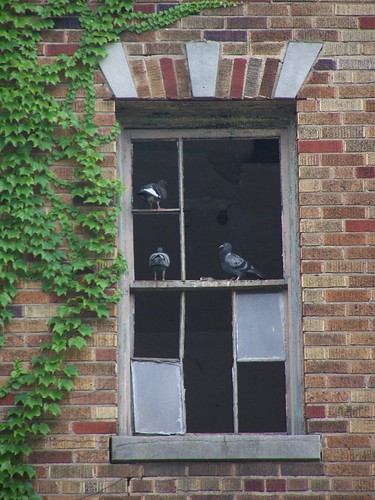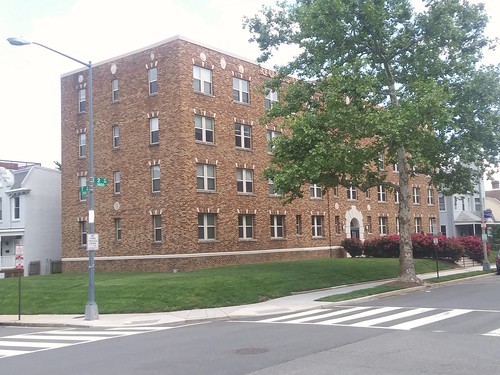Then (2007) and Now (2018): Apartment building at 2nd and T Streets NE
When I make presentations or have discussions about H Street NE /the city today versus what it was like 30 or 20 years ago, people seem to indicate that the improvements visible today are a bad thing, gentrification etc.
It's way more complicated than that. But it sucked before. I can't imagine anyone preferring that to what there is there today.
While these photos aren't from the H Street NE neighborhood, the contrast between then and now is comparable.

Pigeons and disinvestment, 2nd and T Street NE, July 2007.




7 Comments:
Looks like the building was turned into condos?
https://www.redfin.com/DC/Washington/1831-2nd-St-NE-20002/unit-402/home/52433019
Again I don't respect economists much but this is where their concept of an equilibrium is useful.
How to do get values high enough that it makes it worth investing in buildings like this -- and yet not too high to drive run away speculation.
If the sale price is correct (420K) that is a very reasonable unit for the DC area.
It is going to require you going very heavy into debt to buy it at a median wage (120K a year).
we are focusing affordable housing on people making less than 30% AMI -- what is that about 21K a year -- instead of asking whether those people should be sticking around a very high cost area.
It was done a couple years ago by the Menkiti Group. They focus on creating what I think is called workforce housing. Places for regular people to live who aren't lawyers... They've done similar projects in Brookland, I think Columbia Heights, etc. UIP has done some. I can't remember the name of the firm that Buwa Binitie owns. They do it.
The debt thing is something else.
As long as even with additions to supply demand is still significantly greater than supply (+ that pesky issue of new additions to supply being priced at the cost of today's land, labor and materials) prices will be high.
Sorry to be pedantic, of course you know, it's only over multi-decade periods of time that today's new housing becomes tomorrow's affordable housing.
2. The grassroots coalition against development now, their grasp of economics is so weak they make me feel like I am Paul Krugman, and I suck at the mathematical and graphical understandings required of good economists.
Anyway, as you know, you can't restrict as much as possible the addition of new housing in a rising market and expect prices to either stay the same or go down.
How they think not adding housing to the market will ease affordability is beyond me.
3. Well, our reading each others comments goes back a long time, to GGW (which I've mostly taken a break from for the last year). You controversially made that point more than once, a long long time ago.
It's not politically correct. And probably in our not quite Seattle political environment, you can't ever have a reasonable discussion about it.
But in terms of economic conditions, constraints on development, limited build out capacity, etc., does it make sense to focus on that demographic, well no.
But it's probably not even legal to do that vis a vis Fair Housing Laws, HUD laws, etc.
4. There was a national Bisnow story on "the four things that are required for affordable housing." I knew three: cheap land; financing; density bonuses; and the fourth is obviously necessary: facilitating approvals.
You must've seen how AFRH is going to use a stratagem to avoid required DC Govt. approvals of redevelopment. It's smart.
The fear of lawsuits, etc., against development is leading to some huge opportunity costs in terms of reduced production of units, projects foregone, etc.
The DC Budget this year is gonna be $14.5 BILLION. Eventually the ability to pay for a rising budget at that scale will run out, so long as we're not maximizing development capacity (albeit in reasonable ways).
I forgot to say that yep, given the lower cost of housing in PGC, excepting the weak availability of transit, it makes more sense for people with less income to live there.
Note I was at a conference a couple years ago now, probably, and a developer made the point that it was hard to develop new construction affordable housing in PGC, well not develop, but rent it out.
Because new construction AH was still going to be more expensive than old extant not in top notch condition existing housing that was being rented for cheaper/much cheaper. Therefore a lot of vacancy.
1. Thanks for the links to the nation on housing policy.
2. I can see the stuff getting some elite level attraction and possible political traction. De Blasio came into office on "affordable housing". It seem as if 90% of democratic political attention is on "TRUMP" rather than on policy issues, although that is also the time to be making these elite level arguments and laying group work for policy change.
3 I'd say the big problem -- both nationally and in DC here -- is that it really isn't an argument on economics or policy but rather a rehash of much older arugments on re-distribution.
4. I'd say it is the same as T-Neisha Coates making racial based arguments (racial discrimination started in 1888, or 1910 riots, or redlining, or maybe in looser lending standards that killed PG county in 2006) over what is a really a much older, Communist 1930 message on redistribution.
5. Even the communists were less housing policy than that. I remember staying with a russian family in Leningrad in the early 90s at end of USSR; his family had built the mansion/boarding housing pre-revolutionary, the rest was turned into flats but he kept a pretty large place. Just a colorful aside.
6. I'd say the elephant in the room is monetary policy. Reduce the cost to borrow money to nothing and riches flow to those who can borrow! That has been the overriding global angle since 2007.
7. https://www.bloomberg.com/news/features/2018-05-24/small-time-bankers-make-millions-peddling-mortgages-to-the-poor
8. The new court case (today in post) on suing DC for racial discrimination on New Communities is just an example the the housing fight has little to do with housing.
9. The politics (versus the policy) of it that Trump basically killed the MID and gets zero credit from affordable housing advocates.
10. Is the Menkiti project income limited or just cheaper housing?
Haven't seen today's Post yet. But, um, yeah.
But relatedly, yesterday got an email from the Goodwin at large council campaign about "his program for affordable housing." Watched the video. Mostly it was tactics, almost nothing to do with production. (Deal with slumlords, have a better lottery system for access to units, etc.) I thought it said very little and didn't give me any confidence that he is worth voting for.
The Menkiti project was theoretically just cheaper housing. DK if they made special efforts on restricting access to people of more limited means.
Another way to think of it was/is as "starter housing." What the recent press called "middle housing that the area doesn't have." As I said, we have it, it's just been repriced starkly upward because of demand being much greater than supply.
====
yes, no good coherent policy. Wuz looking at the current UM LSA alumni magazine and there is an interesting article about a class focused on bringing Ds and Rs together to build common ground. It's possible on some issues, like homelessness.
Housing policy is one when it comes to access, etc. Not redistribution. Rs would like increasing production, limiting some of the strictures. But not the planning part.
But I've argued for years that AH is an issue much broader than IZ. By not developing a full fledged approach with breadth and focusing all the attention on IZ, so many elements of housing policy were ignored. And as the market tightens, those elements that were ignored become increasingly important.
Suing about New Communities, or fighting additions to supply because in the "short run" they are highly priced pretty much misses what's important and will make a difference. Work for lawyers though... (like suing DC over being told you're not residents for in-city schools).
Production, production, production. That's the only way to have affordability.
Although irrespective of redistribution, the issue is how to provide access to new entrants in the current market, when the market is priced so that only the people with the most money -- or ability to borrow -- can participate because the people already here have most of the housing.
Oh, wrt socialists anyway, Red Vienna and housing is a big counter example. There too, it's production, production, production.
http://prospect.org/article/why-america-needs-more-social-housing
Maybe it will be harder to create a common housing agenda for Rs and Ds than I thought:
https://www.ocregister.com/2018/05/24/dana-rohrabacher-says-its-ok-to-not-sell-homes-to-gays-loses-support-of-realtors
Post a Comment
<< Home